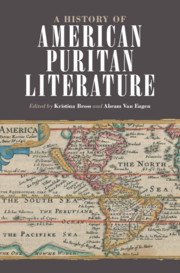Book contents
- A History of American Puritan Literature
- A History of American Puritan Literature
- Copyright page
- Dedication
- Contents
- Figures
- Contributors
- Acknowledgments
- Introduction
- Prologue
- Part I Places
- Chapter 1 Native America
- Chapter 2 British Isles
- Chapter 3 Europe
- Chapter 4 Colonial North America
- Chapter 5 Caribbean
- Chapter 6 Global America
- Part II Approaches
- Afterword
- Appendix
- Index
Chapter 5 - Caribbean
from Part I - Places
Published online by Cambridge University Press: 24 September 2020
- A History of American Puritan Literature
- A History of American Puritan Literature
- Copyright page
- Dedication
- Contents
- Figures
- Contributors
- Acknowledgments
- Introduction
- Prologue
- Part I Places
- Chapter 1 Native America
- Chapter 2 British Isles
- Chapter 3 Europe
- Chapter 4 Colonial North America
- Chapter 5 Caribbean
- Chapter 6 Global America
- Part II Approaches
- Afterword
- Appendix
- Index
Summary
This chapter seeks to reconnect American puritan literary histories with the Caribbean, to show that we cannot fully understand seventeenth-century American literature without taking into account the fact that the Caribbean was a place in which and through which American puritan literature was written. The chapter traces the entanglement of the Caribbean with New England through the circulation and exchange of goods, bodies, citizens, texts, and ideas. The chapter considers, in particular, two historical examples of New England puritan engagement with the Caribbean – the slave trade and Quaker dissent – and two examples of literary engagement – A Continuation of the State of New England (a pamphlet describing King Philip’s War in New England and a thwarted slave rebellion in Barbados) and records from the Salem witch trials. This chapter argues that the both the material reality and the idea of the Caribbean shaped the American puritan imaginary. On the one hand, the islands were key trading partners, and the continued existence of a puritan “New England Way” depended on this trade as a source of steady income. On the other, New Englanders sought to distance themselves from the islands and represent themselves as singularly “godly” English settlers.
- Type
- Chapter
- Information
- A History of American Puritan Literature , pp. 105 - 121Publisher: Cambridge University PressPrint publication year: 2020

